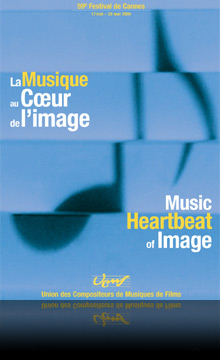Jacques Davidovici : THE INSTINCT OF THE PICTURE
When we watch a film, three kinds of information assail us simultaneously. Primarily of course, the image (at the speed of light!) which is printed on our retina and travels to the brain to be analyzed. Once that image has been decoded the spectator can react emotionally, but only after the brain has "understood" it. Then comes the dialogue, which also addresses principally our mental skills. Even the sound effects, which give a sense of reality to what we can see or guess. More work for the brain.
And then there is the music. Music doesn't address our intelligence; it doesn't need to be understood. Music goes directly to our 'primitive' brain, the part that deals with instincts and emotions. The part that doesn't think, but rather senses or feels. The fact that music doesn't call for reason allows it (and here is the catch) to deliver a completely independent message, at the same time, however, as the message delivered by the images and that of the dialogue. That is cinema: To listen to three languages simultaneously and understand everything at once. Film music is a language full of sense but not seeking to convince us. Autonomous yet entwined with the image.
Music is the intuition of the film and because it speaks to our hearts and not our minds, it is the element of the film that remains the longest in our memory. It is music that prolongs the life of the film for us. If the silence after Mozart is still Mozart, then one can say that the film music, after the film, is still cinema.
LA MUSIQUE AU COEUR DE L'IMAGE |



